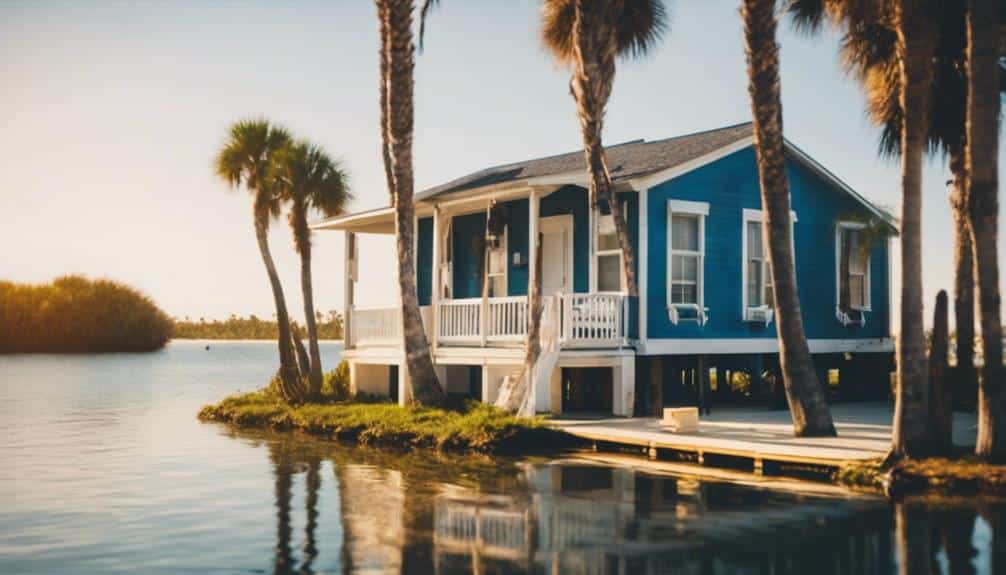Embarking on the quest for your first home on Florida’s West Coast can be challenging, but it’s a hopeful journey for those wanting Florida’s budget-friendly homes. Our guide breaks down the real estate scene, from understanding Florida’s housing market to getting affordable financing. Keep an eye on hidden gems like Bartow and Dade City – they’re great for homeownership dreams without the hefty price tag.
Yet, finding a budget-friendly listing is just the start; you’ll need a strategic approach for property inspection, negotiation, and closing the deal. This guide is your tailored toolkit, giving you the knowledge and tools required. And remember, settling into your new community is crucial for turning your house into a proper home. Florida’s budget-friendly homes await you!
Essential Insights and Key Points to RememberKey Takeaways
- Affordable housing options in Fort Myers, Carrollwood, Sarasota and Brandon caters to varying buyer needs.
- Budget planning should consider median home prices and additional costs like taxes and maintenance.
- Financing options and local down payment assistance programs aid low-to-moderate-income buyers.
- Florida’s west coast offers a favorable climate, job market growth, and community amenities for an enhanced quality of life.
Understanding the Market to Find Florida’s Budget-Friendly Homes
Understanding Florida’s market requires a nuanced analysis of its diverse regions, particularly the West Coast, which offers a range of budget-friendly starter homes. The Florida real estate market is known for its dynamic nature, with the median home price varying substantially across different locales, especially in areas offering affordable housing alongside the allure of waterfront living. For instance, the West Coast of Florida emerges as a beacon for individuals yearning for aquatic vistas without the hefty price tag often associated with such lifestyles.
Cities like Fort Myers and Venice stand out, presenting opportunities for affordable waterfront living with median home prices of $375,000 and $325,000, respectively. These areas epitomize the balance between accessibility to oceanfront or riverfront properties and maintaining a budget-friendly approach to home buying. Moreover, Bradenton and Sarasota extend this ethos, offering economical housing choices centered around family-friendly aquatic activities, with median home prices hovering around $400,000.
This variegated landscape of the Florida real estate market, especially along the West Coast, demonstrates a commitment to providing diverse, affordable housing options that cater to a broad spectrum of homebuyers, reinforcing a sense of belonging among residents.
Budget Planning for Homebuyers
Starting to buy a home requires careful budget planning to guarantee financial stability and prevent overextension. Understanding your financial capacity is critical in this process. By calculating your net monthly income and subtracting regular expenses, you can determine the income available for mortgage repayment.
Setting a budget that does not exceed 30% of this net monthly income for mortgage payments is advisable. This strategy helps avoid long-term financial issues and aligns with recommendations from real estate agents and financial advisors.
Additionally, when budget planning for an affordable home in Florida, consider the median home sale prices and the cost of living in the area. Incorporating additional expenses, such as property taxes and maintenance, into your budget is essential for establishing a realistic and sustainable financial plan. By evaluating your financial capacity before purchasing, you ensure that your dream of buying a home does not stretch your budget beyond your means.
This approach allows you to make informed decisions, seek the assistance of real estate agents, and find an affordable home in Florida that meets your financial and lifestyle needs.
Top Affordable Cities Overview

Exploring Florida’s west coast reveals a selection of cities offering affordable housing options, ideal for first-time homebuyers seeking budget-friendly waterfront living. Fort Myers, for instance, stands out with its appealing median home price of $375,000 along the Caloosahatchee River, providing accessible waterfront living without the hefty price tag often associated with coastal areas. Similarly, Bradenton offers an engaging lifestyle with its economical housing choices near the Manatee River, boasting a median home price of $400,000.
These cities exemplify the West Coast’s allure, blending affordability with the dream of living by the water.
Furthermore, beyond the widely recognized locales of Fort Myers and Bradenton, the broader region presents additional opportunities for budget-conscious buyers. Tampa and Brandon, though not directly on the West Coast, extend the promise of oceanfront and waterfront living at approachable prices, with median home prices of $325,000 and $409,000, respectively. These areas underscore the diverse range of affordable homes available to those who yearn for a slice of Florida’s sought-after waterfront lifestyle, proving that budget-friendly options are plentiful for those willing to explore.
Navigating Real Estate Listings
Browsing real estate listings is essential for potential homebuyers, offering detailed insights into properties’ specifics, such as price, location, size, and unique features. This process equips buyers with the necessary information to make informed decisions, comparing various homes to find one that best suits their needs and budget. Real estate listings, accessible through online platforms like Zillow, Realtor.com, and local real estate websites, serve as a thorough resource for those on the journey to homeownership. Still, we always recommend you work with a top-notch, experienced real estate agent.
These listings are enhanced by high-quality photos and virtual tours, providing a vivid glimpse into each property’s aesthetics and layout. This visual representation is invaluable, allowing buyers to envision themselves in the space before setting foot inside. Listings detail critical aspects of the home, including the number of bedrooms, bathrooms, and available amenities, facilitating a deeper understanding of what each property offers.
Financing Options Explored

The right financing is critical for potential homebuyers, with several loan options for diverse financial situations. Exploring FHA loans can be smart, especially for first-time buyers in Florida’s West Coast area, due to their low down payment requirement of just 3.5%. This option not only makes homeownership more accessible but also encourages those with less upfront capital to start buying a home.
VA loans present an excellent opportunity for military veterans with their competitive interest rates and the notable advantage of requiring no down payment. This can ease the financial burden of purchasing a home and provide a pathway to homeownership that honors their service.
In more rural settings, USDA loans offer 100% financing with low interest rates, a boon for buyers looking in less urbanized areas of Florida’s West Coast. Meanwhile, conventional loans are worth considering for their flexibility in down payment options, catering to a broader range of financial circumstances.
Additionally, local down payment assistance programs can be invaluable in helping cover the upfront costs associated with buying a home. These programs often cater to low-to-moderate-income buyers, making the dream of homeownership more attainable by easing the burden of the down payment.
Inspecting Properties Effectively
As prospective buyers explore budget-friendly starter homes on Florida’s West Coast, understanding the importance of a thorough property inspection is critical. Identifying key inspection areas and spotting potential issues early can prevent costly repairs and guarantee a safer living environment. Enlisting the expertise of professional inspectors is a strategic approach to safeguarding one’s investment and managing the complexities of home ownership with confidence.
Key Inspection Areas
When inspecting properties effectively, it is imperative to prioritize critical areas such as the foundation, roof, electrical and plumbing systems, and HVAC functionality to guarantee safety, efficiency, and long-term value. These inspection areas are essential for identifying potential problems that could lead to costly repairs or hazards in the future.
To engage the audience, consider the following key aspects:
- Foundation: Look for cracks, water damage, or structural issues that could undermine the property’s stability.
- Roof and Electrical System: Inspect the roof for damage and the electrical system for proper wiring and functionality, ensuring safety and avoiding future expenses.
- Plumbing and HVAC Systems: Check for leaks and water pressure issues and assess the HVAC for efficiency and operational conditions to ensure a comfortable living environment.
Spotting Potential Issues
Understanding the importance of meticulous property inspection is essential for identifying potential safety and financial investment issues. During the inspection process, looking for signs of structural damage, water leaks, mold, and pest infestations is critical. These elements not only affect the livability of a property but can also lead to significant financial burdens if not addressed promptly.
Evaluating the condition of the roof, plumbing, electrical systems, and HVAC guarantees they are in good working order, safeguarding against future problems. While conducting a thorough home inspection, it’s beneficial to ponder the expertise of a professional home inspector. Their detailed report can be invaluable in making an informed purchase decision, helping spot potential issues early and avoid costly repairs or maintenance.
Hiring Professional Inspectors
Recognizing the potential for hidden defects and the complexity of modern homes, enlisting the expertise of a professional inspector becomes a strategic step in the property purchasing process. In real estate, professional inspectors are invaluable for uncovering hidden issues that could significantly impact your investment. These specialists provide:
- Detailed Reports: Offering a thorough overview of the property’s condition, allowing buyers to make informed decisions.
- Specialized Tools and Equipment: Utilized to thoroughly assess critical systems such as electrical, plumbing, and HVAC.
- Identification of Safety Hazards: Uncovering potential safety hazards, code violations, and maintenance issues that could affect the property’s value or lead to costly repairs.
Hiring a professional inspector is essential to navigate the complexities of purchasing a home, ensuring safety, and protecting your investment against unforeseen expenses.
Negotiation Strategies for Buyers
To effectively navigate the complexities of purchasing a starter home on Florida’s West Coast, buyers must adopt strategic negotiation tactics informed by current market conditions and the specific motivations of sellers. Understanding the local real estate landscape, including the nuances of negotiation, market conditions, property history, and the importance of presenting a competitive offer, is essential. Leveraging the expertise of a seasoned real estate agent can significantly enhance your ability to secure a favorable deal.
| Factor | Importance | Strategy |
|---|---|---|
| Market Conditions | High | Analyze local trends and comparable home prices to inform your offer. |
| Seller’s Motivation | Medium | Tailor your approach based on the seller’s circumstances. |
| Property History | Medium | Investigate past transactions and listings to gauge flexibility. |
| Property Condition | High | Use the condition to negotiate price adjustments or repairs. |
| Real Estate Agent | Critical | Utilize their expertise for market insights and negotiation leverage. |
Closing the Deal Smoothly

As prospective homeowners approach the final stages of purchasing a budget-friendly starter home on Florida’s West Coast, understanding and managing closing costs becomes paramount. A thorough review of fees for title insurance, appraisal, and escrow and a strategic final walkthrough can safeguard against unforeseen expenses and guarantee that the walkthrough meets all agreed-upon standards. This segment will explore practical strategies for handling closing costs and provide actionable tips for conducting a meticulous final walkthrough, both critical steps in ensuring smooth closing costs.
Understanding closing costs is essential in ensuring a smooth home-buying process on Florida’s West Coast, with expenses typically ranging from 1.5% to 4% of the property’s purchase price. For those seeking affordable property within the constraints of the median household income, it is critical to get acquainted with these costs, which include:
- Appraisal and inspection fees
- Title search and insurance costs
- Loan origination fees
Moving through and negotiating closing costs effectively can significantly impact your financial planning. Engaging a knowledgeable real estate agent can be instrumental in understanding these costs and exploring avenues for negotiation. This strategic approach aligns with acquiring an affordable home and ensures home price discussions include all ancillary expenses, facilitating a more thorough budget planning.
Final Walkthrough Tips
Having covered the significance of understanding ClosWalkthrought, it’s now essential to focus on the final walkthrough, a pivotal step in ensuring a smooth home-buying experience. This is crucial for verifying that all conditions agreed upon are met to your satisfaction.
| Category | Checklist Item | Purpose |
|---|---|---|
| Repairs & Changes | Ensure repairs are completed | Confirms agreement fulfillment |
| Appliances & Systems | Check all are working | Verifies functionality |
| Property Condition | Confirm cleanliness and condition | Ensures property is as expected |
| Personal Property | Verify that included items are present and in condition | Affirms what’s included in the sale |
| Last-Minute Issues | Note any discrepancies | Addresses potential problems before closing |
Settling Into Your New Community
Entering a new community demands a thorough assessment of local amenities, housing affordability, and lifestyle offerings in cities like Sarasota, North Port, Fort Myers, Apollo Beach, and Bradenton to guarantee a smooth adaptation to your new surroundings. As you begin on the journey of settling into your new community, understanding the unique characteristics of these cities becomes paramount. Each locale presents a distinct blend of waterfront living, easy beach access, abundant recreational activities, and family-friendly environments, all contributing to a profoundly satisfying living experience.
To guarantee a seamless change, consider the following:
- Evaluate Local Amenities and Community Features: Investigate the proximity to essential services such as schools, shopping areas, and healthcare facilities. Each city boasts unique community features that cater to different lifestyles, from vibrant nightlife in Fort Myers to the serene beach life in Cocoa Beach.
- Assess Lifestyle Offerings and Housing Affordability: Understanding the balance between lifestyle offerings and housing affordability is critical. Cities like Palm Bay and Port St. Lucie offer budget-friendly starter homes without compromising lifestyle quality.
- Explore Outdoor Recreation Options: The availability of outdoor activities can significantly enhance your quality of life. Whether water sports in Bradenton or hiking trails in Palm Bay, embracing local outdoor recreation fosters community connection and personal well-being.
Frequently Asked Questions
Where Is the Nicest but Cheapest Place to Live in Florida?
Bradenton is a commendable choice regarding the inquiry for Florida’s most excellent yet affordable living area. It offers a blend of economical housing, coastal lifestyle, and diverse aquatic activities, with a median home price of $400,000.
What Is the Least Expensive Coastal Town in Florida?
The least expensive coastal town in Florida is Frostproof, featuring a median home price of $224,723. It stands out for its affordability, offering budget-conscious individuals a viable option for coastal living and home ownership.
What Part of Florida Has Affordable Housing?
Florida’s west coast, like a hidden gem, offers affordable housing options. Largo, Fort Myers, Cape Coral, and Clearwater provide budget-friendly homes amidst vibrant communities, catering to those seeking a sense of belonging.
What Do I Need to Buy a Home for the First Time in Florida?
To buy a home for the first time in Florida, you’ll need a down payment of 3%-20%, a credit score of at least 580, and a budget for closing costs between 2%-5%. Explore various loan programs.
Conclusion
Are you looking for your first home in Florida? Here’s what you need to know.
Before you start browsing listings, take time to figure out how much you can afford. Consider your income, credit score, and monthly payments, including closing costs, insurance, and property taxes. Once you understand your budget, you can look for a property that fits your needs and lifestyle.
When you’re ready to apply for a mortgage, ensure you have a preapproval letter from a mortgage lender. This will help you determine your eligibility and give you an idea of what you can afford. Florida Housing Finance Corporation offers a variety of mortgage programs and payment assistance programs for first-time home buyers, including those with low incomes or bad credit.
Once you’ve found a property you like, you must work with a real estate agent and title company to ensure the home fits you well. You must complete a mortgage application and provide income and credit history documentation. The application process can be lengthy, and you must be patient while waiting for approval.
Remember, buying a home is a significant investment, and it’s essential to take the time to find the perfect one for you. With the proper preparation and a little research, you can achieve the dream of homeownership and start enjoying the many benefits of owning your home in the Sunshine State.







